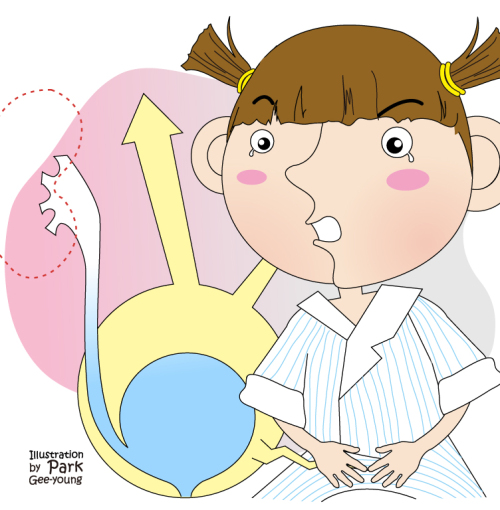Children can develop many different types of urological disease. Unlike adults, small children have difficulty describing their symptoms, which means that doctors often miss the best moment for treatment.
This can lead to various pathological conditions arising from disease or injury, so special attention is required. The most common cause of urinary tract infections in children is vesicoureteral reflux.
What is vesicoureteral reflux?
Vesicoureteral reflux is the backward flow of urine from the bladder to the ureter, which happens as the bladder is collecting urine or while the patient is urinating.
In a patient with vesicoureteral reflux, urine in the bladder flows backward into the kidney relatively easily so, if there is a bacterial infection in the bladder, it is highly likely that it will spread to the kidney resulting in symptoms such as high fever, chills accompanied by pain in the side, diffuse muscle pain and gastrointestinal problems.
Because children have difficulty describing their symptoms clearly, this problem is commonly diagnosed on the basis of the results of a urine test after the child has been brought in with flu-like symptoms. The kidneys of children are more susceptible to damage as a result of inflammation from bacterial infections.
The seriousness of the kidney damage will depend on the age of the child (younger children are more susceptible) and the amount of reflux. The damage may be irreversible and can cause high blood pressure and other complications. Long-term dialysis or transplantation may be necessary if kidney function is impaired, especially if both kidneys have been seriously damaged. Therefore, early diagnosis and treatment of vesicoureteral reflux is very important.
Can the problem spontaneously regress?
The natural history of vesicoureteral reflux depends on the patient’s age and the degree of reflux. If the reflux is mild or the child is young, it may well disappear without treatment.
In contrast, if the reflux is more severe, the child is older, the problem has failed to resolve after a prolonged wait since diagnosis, or if the involvement is bilateral, the probability of spontaneous regression is low.
What is treatment?
The treatment of vesicoureteral reflux involves continuous prophylactic antibiotics or surgery. If the probability of spontaneous regression is high, antibiotics are prescribed to prevent bacterial infection while the progression of the disease is monitored.
Antibiotic treatment does not cure the reflux but prevents bacterial infection of the kidneys until the underlying problem disappears. However, for cases of severe reflux and when febrile urinary tract infection recurs despite the use of prophylactic antibiotics, surgery may be necessary.
What kind of surgeries are available?
There are two major surgical methods: open surgery and endoscopic injection therapy.
Open surgery involves a 3-4 cm incision in the lower abdomen and reimplantation of the ureter on the bladder. The procedure takes about 2 hours and requires a 4-5 day stay at the hospital. The success rate is 95-98 percent.
These days, endoscopic surgery is commonly used, mainly for cases of moderate reflux. The procedure takes about 15 minutes. Because the abdomen is not cut open, surgical scarring is minimal and the operation can be performed on an outpatient basis. However the success rate is only 60-80 percent, far lower than that of open surgery.

Baek Min-ki
By Baek Min-ki
The author is a professor at Sungkyunkwan University college of Medicine and pedicatric urologist of Samsung Medical Center. ― Ed. 






